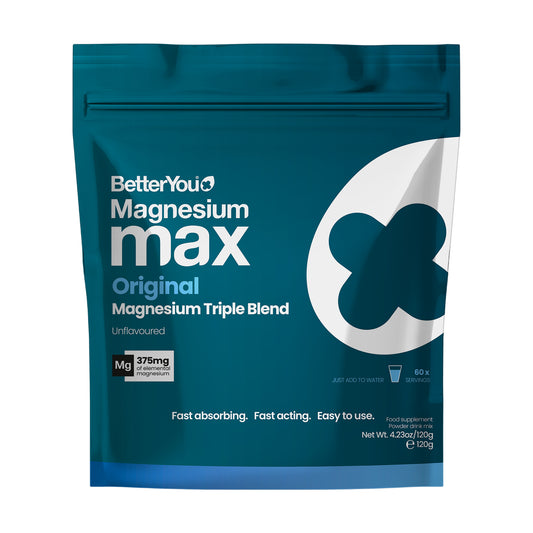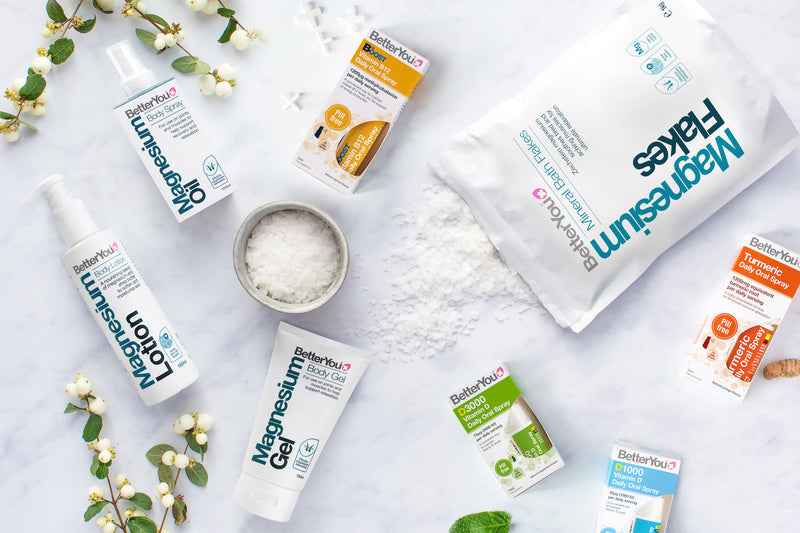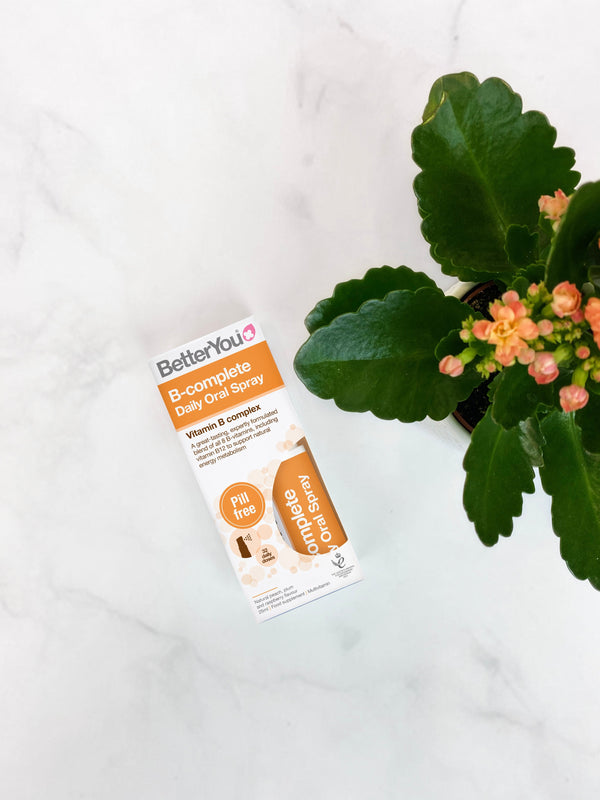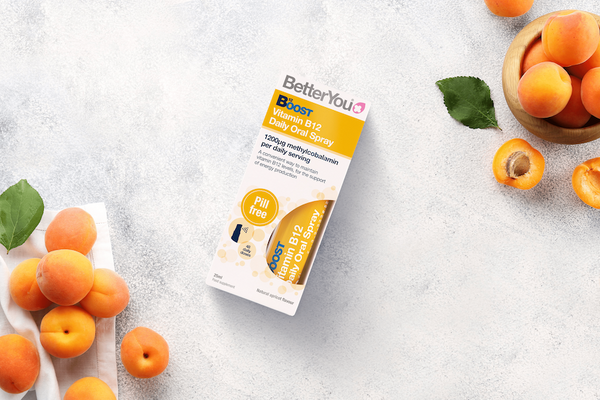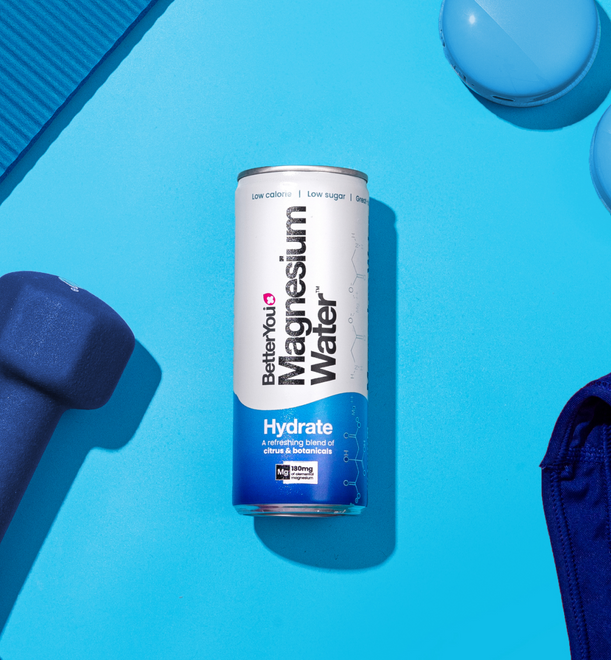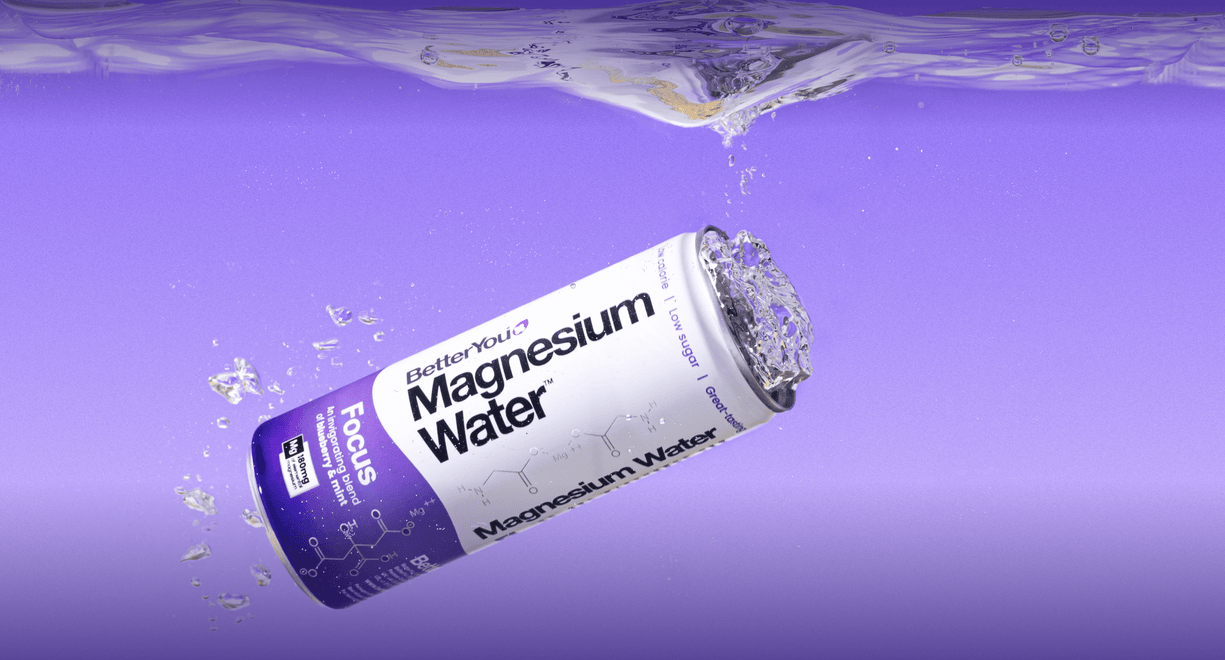Vitamin and mineral deficiencies cause health problems which occur when your vital nutrition levels are too low. Spotting vitamin and mineral deficiency is vital to maintaining a healthy lifestyle and normal bodily function. Not getting enough of vital nutrients could cause long term symptoms and medical issues. Knowing what deficiencies you could be at risk of, and how to prevent them is essential to keep your body working at its best and avoiding danger of deficiency-caused illnesses.
Table of Contents:
- What is Deficiency?
- Leading Causes of Vitamin & Mineral Deficiencies
- Common Deficiencies
- Magnesium Deficiency
- Iron Deficiency
- Vitamin D Deficiency
- Vitamin B Deficiency
- Vitamin C Deficiency
- Vitamin K Deficiency
- Vitamin A Deficiency
- Vitamin E Deficiency
- Supplementing with BetterYou
What is Deficiency?
To be deficient means to be lacking in something. In regards to a vitamin or mineral deficiency, this will be the lack of essential nutrients. Suffering from a vitamin or mineral deficiency means the levels of these vital nutrients are too low in your body. Not getting enough of these vital nutrients could put you in danger of health problems if not remedied.
When you lack these essential nutrients, symptoms of deficiency develop because the processes of the body are not being carried out effectively. There are signs and symptoms which you can look out for to indicate a deficiency or low nutrient levels. Those struggling to intake enough types of minerals and vitamins through their diet, due to malabsorption or dietary restrictions, may consider taking supplements to support better nutritional intake.
Leading Causes of Vitamin & Mineral Deficiencies
The most common cause of vitamin and mineral deficiencies is from not eating the right foods for sufficient nutrient intake. Finding foods which are sources of essential nutrients is the most straightforward way to increase intake and prevent vitamin and mineral deficiency. However, this isn’t always so simple.
People with dietary restrictions and allergies may struggle to find enough sources of the individual vitamins and minerals to intake sufficient amounts.
- Vegans may wish to take vegan supplements to provide them with supplements vegans should take.
- While vegetarian supplements bridge the gap of supplements vegetarians should take.
That way, everyone can obtain a balanced intake of vitamins and minerals.
Malabsorption, an issue wherein the intestine does not absorb nutrients properly or effectively, can cause vitamin and mineral deficiencies. Malabsorption can be caused by gastrointestinal health problems such as Crohn’s, IBS, and celiac disease. This means that even if someone is eating the right foods, their body struggles to absorb these nutrients, and they could develop a deficiency and the health problems it comes with.
Common Deficiencies
Anyone could develop a vitamin or mineral deficiency in any of the main groups of vital nutrients. It simply means you aren’t getting enough. Some prevalent deficiencies to be aware of include:
- Magnesium Deficiency
- Iron Deficiency
- Vitamin D Deficiency
- Vitamin B Deficiency
- Vitamin C Deficiency
- Vitamin K Deficiency
- Vitamin A Deficiency
- Vitamin E Deficiency
For some, simply taking a multivitamin supplement can be more straightforward. All the essential nutrients in one place, to help you look after your body’s vital functions and avoid deficiency. However you choose to supplement, keep to nutrient reference values of each vitamin or mineral to ensure you intake the correct amount.
Magnesium Deficiency
Magnesium is responsible for over 300 reactions in the body, such as making proteins, muscle function, and keeping the heartbeat steady. Suffering from magnesium deficiency means these processes aren’t happening as well as they should. Magnesium plays a role in sleep, is important to muscle and nerve function, and helps to keep your natural energy levels up.
Some signs you are suffering with low magnesium include:
- Poor sleep
- Fatigue
- Heart palpitations
People more at risk of magnesium deficiency include those pregnant or breastfeeding. Pregnancy is an important time when it comes to nutrient intake, and some may consider taking pregnancy supplements to help support health during this time. People with gastrointestinal disorders, type 2 diabetics, elderly people, and those taking medications which may inhibit magnesium absorption, are also at risk.
Magnesium supplements can be used in another form known as transdermal, or topical, magnesium. Transdermal magnesium is applied to the skin in creams and lotions, as an easy and pill-free alternative to traditional supplementation. They are made from a pure form of magnesium chloride known as Zechstein magnesium. This pure mineral can help to avoid deficiency by encouraging optimal intake. Skin supplements often include magnesium to help combat dry, tired and cracked skin.
Iron Deficiency
Iron is a mineral essential to your blood. Your body needs iron to process food and provide energy, as well as to help create red blood cells. Red blood cells are what carry oxygen around the body, so making sure you have enough iron is very important. Without enough, the body cannot get enough oxygen and this could lead to tiredness. Energy supplements often contain iron in order to help boost your natural energy levels.
Some signs of low iron include:
- Tiredness and lack of energy
- Pale skin
- Shortness of breath
- Noticeable heartbeat
- Craving non-food items (Pica)
Although anyone could develop iron deficiency, some people may be more at risk. Vegans and vegetarians who exclude red meat and other animal products from their diet, those who have heavy periods, athletes, those pregnant, and anyone with malabsorption issues are more likely to suffer from iron deficiency. Testing your iron levels using an at-home Iron Test Kit is a good way to keep on track of your iron intake. People regarded as at-risk of iron deficiency may consider monitoring their iron levels in this way.
Including more foods rich in iron is one way to increase your natural iron intake, and taking supplements can help to support your iron levels. BetterYou’s iron supplements are in a pill-free oral spray form, which don’t rely on intestine absorption, so these side effects can be avoided.
Vitamin D Deficiency
Vitamin D, also known as “the sunshine vitamin”, works to support your bones by regulating calcium levels within the body. Vitamin D is important as the vital nutrient which helps your body absorb calcium. Bone supplements often contain vitamin D to support optimum bone support. It also plays a role in muscle function, serotonin, and immune health. Not getting enough could lead to vitamin D deficiency and health problems.
Some signs you may be suffering with low vitamin D include:
- Aching bones
- Weak muscles
- A low mood
- Constant coughs and colds
People more at risk of vitamin D deficiency include those with gastrointestinal problems, those pregnant or breastfeeding, elderly people, and children. These people may consider testing their vitamin D levels using a Vitamin D Test Kit. This way, you can keep track of your intake, and ensure you’re supporting your vitamin D levels.
As the body absorbs vitamin D from the sun, getting enough safe sun exposure is important for natural levels of vitamin D. If you cannot get enough vitamin D from sun exposure or diet, taking vitamin D supplements can be a great way to air sufficient intake.
Vitamin B Deficiency
The term ‘vitamin B’ actually includes the multiple types of vitamins that are in the B family. They are responsible for the workings of enzymes in the body so it is important to get the right amounts. Vitamin B12 is the most commonly known of the B vitamins, because it is important for the brain, blood, and DNA. Vitamin B12 is the most common form of vitamin B deficiency, so it’s important to know the signs to look out for.
Some signs of low vitamin B12 deficiency include:
- Tiredness and fatigue
- Pale skin
- Poor mood
One of the most common causes of vitamin B12 deficiency is pernicious anaemia. This is an autoimmune condition which can affect vitamin B12 intake. People who may be more sensitive to vitamin B deficiency include pregnant people, those with digestive issues, vegetarians and vegans, and those over the age of 60. Using an at-home Vitamin B Test Kit is one way people at risk of deficiencies keep track of their intake and support their body.
Taking vitamin B supplements can help to boost the levels of this vital nutrient in your body, and help your enzymes work at their best.
Vitamin C Deficiency
Vitamin C, also known as ascorbic acid, is known for its role in healing, as well as tissue and immune health. The vitamin also contributes to bone and teeth health, and to the absorption of iron. Vitamin C deficiency, therefore, can cause health problems if the role of vitamin C cannot be carried out effectively. Spotting the signs is vital to a healthy lifestyle.
Some signs of low vitamin C include:
- Spoon-shaped fingernails
- Dry skin
- Weak bones
- Bumpy skin
- Corkscrew-shaped body hair
- Red hair follicles
- Easy bruising
Vitamin C deficiency could impact anyone who is not getting enough of the nutrient in their diet. There are some people more at risk though. These include people who eat very little fruits and vegetables, as well as those who smoke, and those who are pregnant. For these people taking supplements to increase intake would be recommended because vitamin C can help to support the immune system.
Vitamin C supplements can help to increase vitamin C intake alongside eating foods rich in vitamin C like fruits and vegetables. The BetterYou Vitamin C Oral Spray uses intraoral spray technology to help you support your vitamin intake, with a great tasting cherry and blueberry flavour.
Vitamin K Deficiency
Vitamin K is a fat-soluble vitamin responsible for helping proteins in your body move calcium into your bones. This way, the calcium in your blood keeps moving, instead of potentially hardening or “calcifying”. Because of their roles in bone function, vitamin K and vitamin D work together to absorb calcium and then move it into the bones.
It is more common to suffer from vitamin K deficiency regarding vitamin K2. This is because vitamin K1 can usually be found in food in sufficient amounts. Some signs of low vitamin K2 to know include:
- Excessive bleeding
- Bruising
- Blood under nails
Some people more at risk of vitamin K deficiency include those who are post-menopausal, elderly, or very young, including newborns. Those with malabsorption and dietary restrictions may also be more susceptible to vitamin K deficiency.
Vitamin K supplements can help you to increase your nutrient intake alongside eating foods rich in the vitamin.
Vitamin A Deficiency
Vitamin A, also known as retinol, is responsible for helping your immune system build a natural defence against illness and infection. It also plays a role in eyesight; allowing you to see better in dim light. Vitamin A also keeps your skin and lining of body parts, such as the nose, healthy. Not getting enough vitamin A can cause certain problems such as inflamed skin.
Some common signs of low vitamin A include:
- Dry, inflamed skin
- Dry eyes
- Night blindness, difficulty seeing in low light
- Throat and chest infections
Those more at risk of developing vitamin A deficiency include those who are pregnant, however, having too much vitamin A during pregnancy can risk hurting unborn children. Infants and children are also more likely to be low in vitamin A. Children’s Vitamins can help your little one to get all their vital nutrients to help them grow and develop as they should.
Vitamin A levels can be supported by eating more foods rich in the nutrient, such as:
- cheese
- eggs
- oily fish
- fortified low-fat spreads
- milk and yoghurt
- liver and liver products such as liver pâté
Vitamin E Deficiency
Vitamin E supports your immune system, as well as playing a role in your skin and eye health. Deficiency is rare because it is unlikely to be caused by a lack of the vitamin in diet. Usually, it is because of malabsorption and metabolism issues. If this occurs, there are some signs to look out for.
These signs include:
- Loss of feeling in arms and legs
- Loss of body control
- Muscle weakness
- Weakened immune system
Those more likely to be low in vitamin E are those who suffer from malabsorption, for example those with cystic fibrosis, Crohn’s disease, or short bowel syndrome.
Eating enough foods which contain this vital nutrient can help to support your levels to be where they need to be. Good sources of vitamin E include:
- plant oils – such as rapeseed (vegetable oil), sunflower, soya, corn and olive oil
- nuts and seeds
- wheatgerm – found in cereals and cereal product
You should seek medical advice from your GP or other health professional if you think you have any of these signs of vitamin and mineral deficiencies. A medical professional may arrange a test to identify whether you have low nutrient levels or vitamin and mineral deficiency. Always consult medical advice before taking vitamin and mineral supplements.
Pill-free supplements from BetterYou
Our range of vitamin oral sprays and topical magnesium supplements provide a fast, effective alternative to traditional tables and capsules. Scientifically formulated to deliver maximum nutrient absorption, with minimum fuss, to help you feel and live better.
